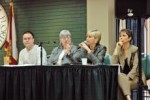Global warming debate heats up at USF

A symposium on global warming in the Marshall Center on Wednesday became heated when a radical environmental group used the meeting to express its own agenda.
Members of Earth First!, a radical environmental group, interrupted a question and answer session during the symposium by directing their questions to the audience instead of the panelists. They asked the audience who they were going to believe, the energy companies or the Earth. They also demanded that the audience take action and were eventually hushed by the others in attendance so non-Earth First! members could address the panel.
The conference was part of a national teach-in USF participated in to address the effects of global warming on society and culture.
Organized by Student Government and Students for the Marketing & Advancement of Renewable Technologies (SMART), the event hosted 18 educators and leaders in the energy community. Acting as panelists and instructors, these people presented problems posed by and possible solutions for global warming in a three-hour event that was split into six sessions. On the panel, they encouraged the audience to ask questions about the environmental problem at hand.
“This has been a day we’ve been looking forward to, a debate on climate change,” said Mike Archambault, president of SMART.
Most of the discussion focused on the effects of global warming on Florida. Michael Ohlsen, project manager of the Florida Energy Office, shared what Gov. Charlie Crist is doing to improve Florida’s environment.
At the Climate Summit – a summit organized to address the environmental problems Florida faces – Crist implemented a few executive orders to address the issue. One of these was Leadership by Example. As a result of this order, the state hopes to lower carbon emissions by 40 percent by 2025. To achieve this goal, state buildings constructed in the future must be energy efficient and include solar panels. Leased office space must be in energy-efficient buildings. All state vehicles should be fuel-efficient and use ethanol and bio-diesel fuels.
“There is no silver bullet, no one-size-fits-all – it’s going to take a lot of different things to come to an answer,” Ohlsen said.
The state is also initiating the Farm to Fuel grant program, Ohlsen said. This program uses farm waste such as orange rinds for energy. They hope to branch out from corn and delve into crops that Florida can produce, such as sugar cane and cultivated algae, to produce ethanol. There is also research being done on wind and ocean energy for hydroelectricity.
“It is my hope that everyone who is here to listen and learn leaves much SMART-er,” said Dwayne Smith, senior vice-provost of the Department of Criminology.
Martin Schonfeld, panelist and professor of philosophy, said it’s tough to change human behavior and habits. There are psychological barriers, such as the belief that one action won’t make a difference, that prohibit society from moving forward. The solution is to think and behave green, to move beyond a carbon economy and a consumer society, he said.
“Opt out, live small, and think big,” Schonfeld said.





